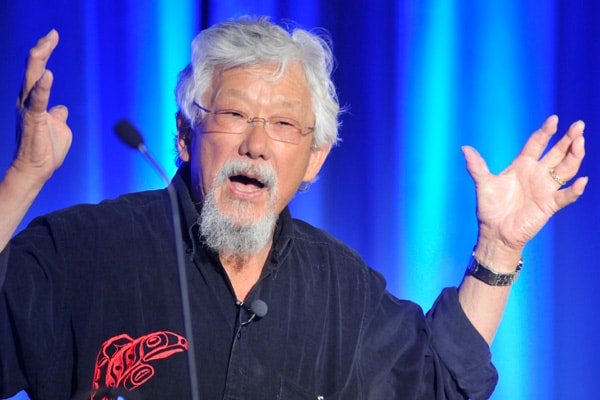
Suzuki delivers message about limits of the natural world
Published: March 8, 2012
Humans face catastrophic environmental change unless we understand that we live in a natural world with inherent limits, says David Suzuki, renowned scientist, activist and environmentalist.
Speaking passionately to an enthusiastic overflow audience at U of T Scarborough's 2012 Watts Lecture, Suzuki told the audience that humankind has failed to understand that the economy and human society are embedded in the biosphere, which places physical constraints on what we can do.
“The problem is perceptual,” Suzuki said. “We see the world through anthropocentric lenses – as if we’re at the centre of everything and everything else is out there around us.
“We need to see the world through a bio-centric view, a way of seeing that we’re a part of a wonderful web of living things and that our very survival and well-being depends on the health and well-being of the rest of nature. We’ve got to see the world as it really is.”
An anthropocentric view of the world gives the illusion that we can balance the needs of the environment with the needs of the economy, he said. In fact, all human activity depends on a healthy environment. Once we’ve done too much damage to the environment – through human-caused global warming, for instance – our economy will necessarily suffer, and we risk catastrophe.
Suzuki has been an award-winning broadcaster in Canada for the last 30 years. He is the long-time host of The Nature of Things With David Suzuki. He is also co-founder of the David Suzuki Foundation.
Physics, chemistry and biology impose natural limits that we can’t overcome, despite our desire for more things.
“The borders we draw around cities and countries, those are not forces of nature,” he said. “We created them. Other things -- like capitalism, currency, markets, corporations, the economy -- these are not forces of nature. We invented them. If we invented them we can change them. And yet we've come to think these things are so important.”
Suzuki was pessimistic that politicians would make the painful long-term changes required to stave off disaster and believes they would prefer to continue selling off the future of young people.
But he also counselled the audience not to despair and said that it is important for young people to “get up and make some noise” and demand changes to save their futures."
The annual Watts Lecture series invites distinguished speakers with broad appeal to speak at UTSC on issues of global concern. This year’s installment was co-presentation by UTSC and We Canada, a non-partisan, youth-led citizen initiative aimed at mobilizing support and leadership on sustainability issues ahead of the upcoming earth summit this June in Rio de Janeiro. Suzuki’s lecture is part of We Canada’s cross-country tour, Dialogue and Action for Earth Summit 2012.



